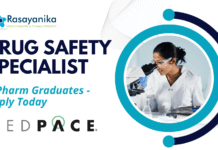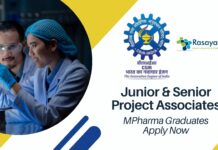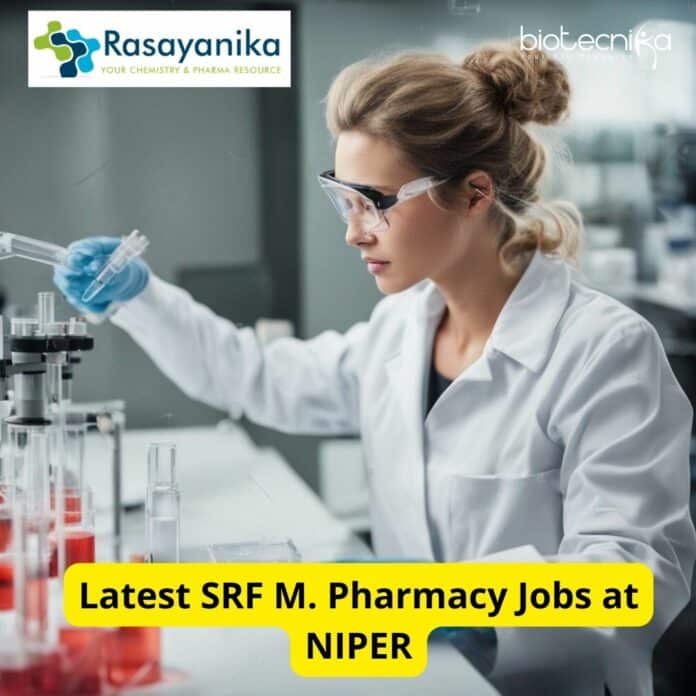SRF/RA at NIPER-ICMR Funded Project -Latest M Pharma Jobs-View Notification
SRF/RA at NIPER. Latest M Pharmacy Job. Interested candidates can check the notification and application form below.
National Institute of Pharmaceutical Education and Research- Ahmedabad
(Department of Pharmaceuticals, Ministry of Chemicals and Fertilizers, Govt. of India)
Palaj, Opposite Air Force Station, Gandhinagar-382355, Gujarat, India
RECRUITMENT OF SRF/RA IN ICMR SPONSORED RESEARCH PROJECT
(Project No: NCD/Ad-hoc/223/2022-23 )
Applications are invited from the eligible candidates for a SRF/RA position in a ICMR funded project to be undertaken at the Department of Biotechnology, NIPER- Ahmedabad. The position is temporary, and the job offer will be initially for one year that can be extended further for two more years based on the performance and will be co-terminus with the project. The requisite qualification & experience etc., are given below.
Positions: SRF/RA
Project Title: Development and validation of Patient-derived organoids as an in-vitro drug
screening model for predicting treatment for oral cavity squamous cell
carcinoma patients
Principal Investigator: Dr. Amit Mandoli Assistant Professor (Department of Biotechnology) Email: amitmandoli@gmail.com
Co-Principal Investigator: Dr. Hemant Kumar Assistant Professor (Department of Pharmacology) Email: hemant@niperahm.res.in
Funding Agency: Indian Council of Medical Research (ICMR)
Salary: Rs. 35000 + 9450 (27% HRA) = 44,450
Desirables Qualification and Experience:
- M.Sc./M.Tech/MPharm/Masters degree in Life Sciences/ Biotechnology or Equivalent with minimum 60% marks or a minimum CGPA of 7.0 on a 10 point scale
- At least 2 years of the research experience after masters degree.
- Candidate having experience in cell and organoid culture / 3D cell culture/ Molecular and cellular assays/ transduction/transfection,CRISPR-Cas9 assays or RNA-seq/ NGS data analysis/ R/ Python will be preferred.
Job Profile:
Date and time of the Interview:
Interested candidates should send their applications strictly in the attached application format via email to the Registrar, NIPER-A (rolling.recruitment@niperahm.res.in) with a copy to the Principal investigator on Email id (amitmandoli@niperahm.res.in) on or before 6th September 2023. Please write “Application for SRF/RA” in the subject line of the email. The interview (offline/online) will be held on Thursday, 12th September, 2023 from 10:00 AM onwards.
Application Instructions:
- Original certificates and self-attested copies of all certificates need to be presented before the interview for verification.
- No TA/DA will be paid for attending the interview.
- Canvassing in any form will lead to disqualification of candidature.
- The application should be strictly according to the attached format
VIEW NOTIFICATION AND APPLICATION FORM
Here are few interview questions with answers for the role of SRF/RA at NIPER:
1. Can you describe your experience in cell and organoid culture and its relevance to this research project?
Answer: During my previous research experience, I actively worked on cell and organoid culture techniques. I have hands-on experience in establishing and maintaining various cell lines and organoid models relevant to cancer research. This experience will be particularly valuable in the development and validation of patient-derived organoids as an in-vitro drug screening model for oral cavity squamous cell carcinoma patients, as outlined in the project.
2. The project involves molecular and cellular assays, transduction/transfection, and possibly CRISPR-Cas9 assays. Can you provide examples of your experience with these techniques?
Answer: Certainly. I have conducted molecular and cellular assays to investigate various cellular processes, such as cell proliferation and apoptosis, using techniques like PCR and western blotting. Additionally, I have experience in transduction and transfection methods, having worked with viral vectors and plasmid DNA delivery systems. While I haven’t directly worked with CRISPR-Cas9 assays, I am familiar with the principles and protocols and can quickly adapt to this technique if required for the project.
3. How do you plan to handle and analyze NGS data for this research project, and do you have any experience with bioinformatics tools like R or Python?
Answer: Handling NGS data is a critical aspect of this project. I have prior experience in analyzing NGS data generated from various experiments. I am proficient in using bioinformatics tools like R and Python for data analysis and visualization. I can perform tasks such as quality control, alignment, variant calling, and downstream analysis to extract meaningful insights from the data, which will contribute to the success of this project.
4. In a dynamic research environment, collaboration and adaptability are essential. Can you provide an example of a situation where you had to collaborate with others to achieve a research goal and how you adapted to unexpected challenges?
Answer: Certainly. During my previous research project, we encountered unexpected challenges related to reagent shortages and equipment failures. To overcome these obstacles, I collaborated closely with colleagues from different disciplines within our research team. We adjusted our experimental timelines, shared resources efficiently, and even explored alternative approaches to stay on track. This experience taught me the importance of adaptability and effective teamwork, skills that I believe are crucial for success in this dynamic research environment.
Follow RASAYANIKA for more chem and pharma related job updates.

















































